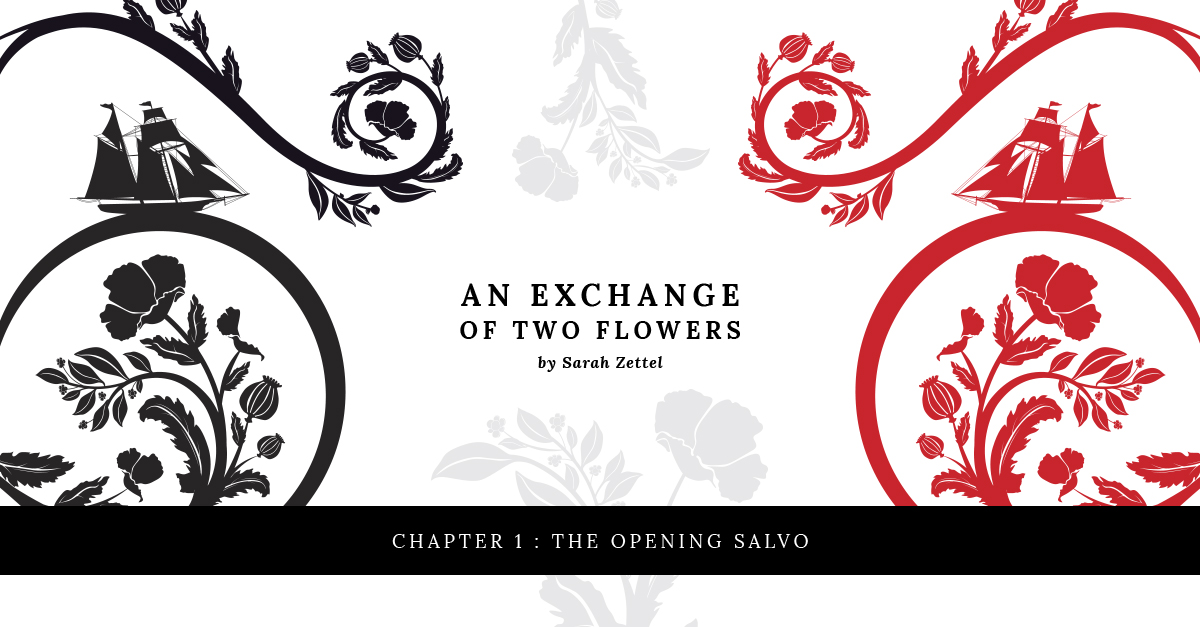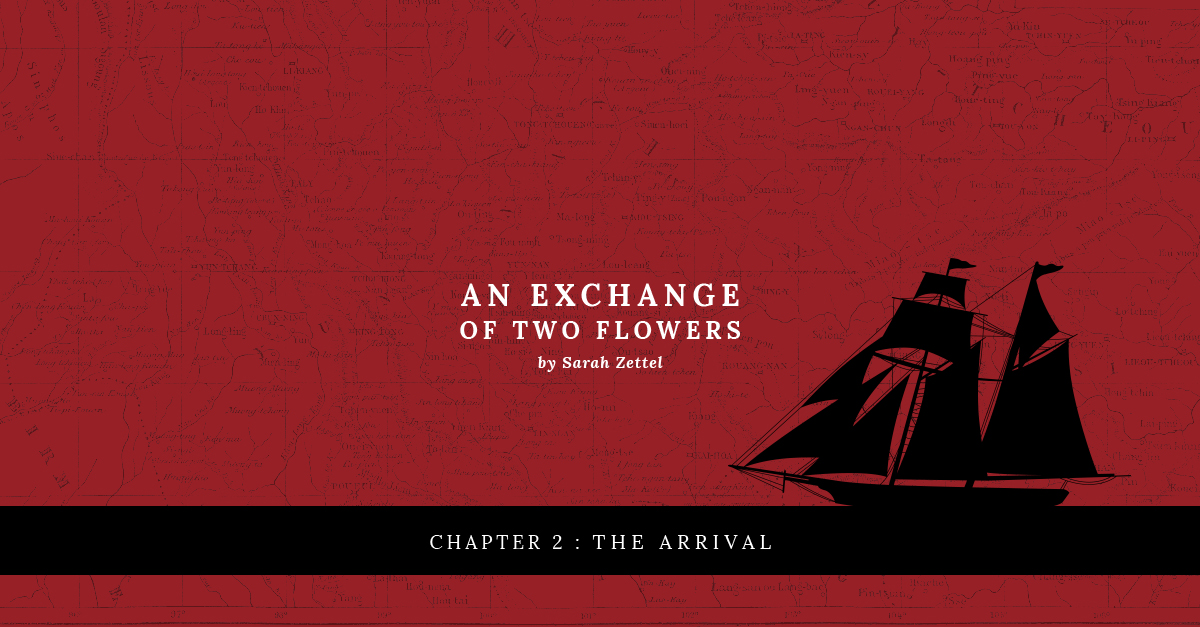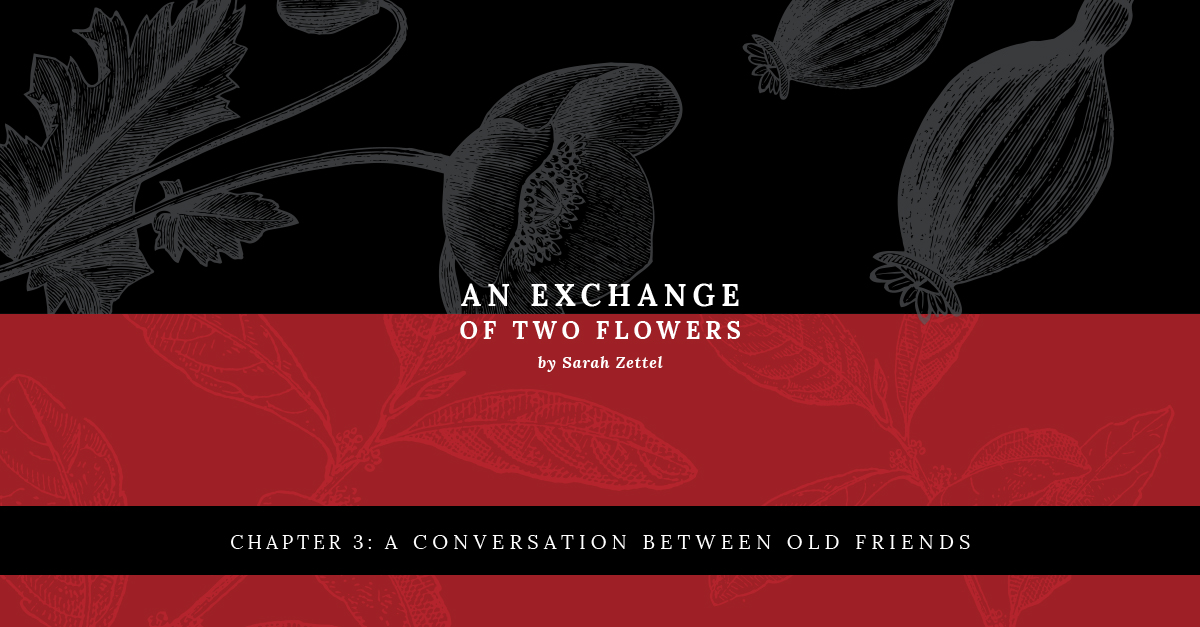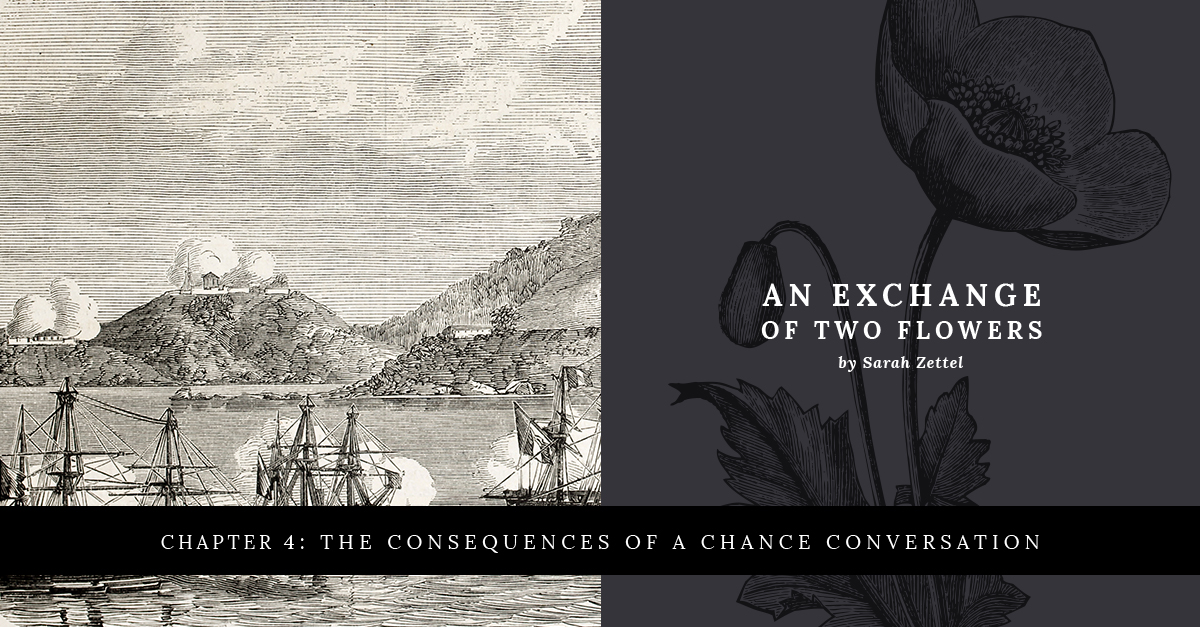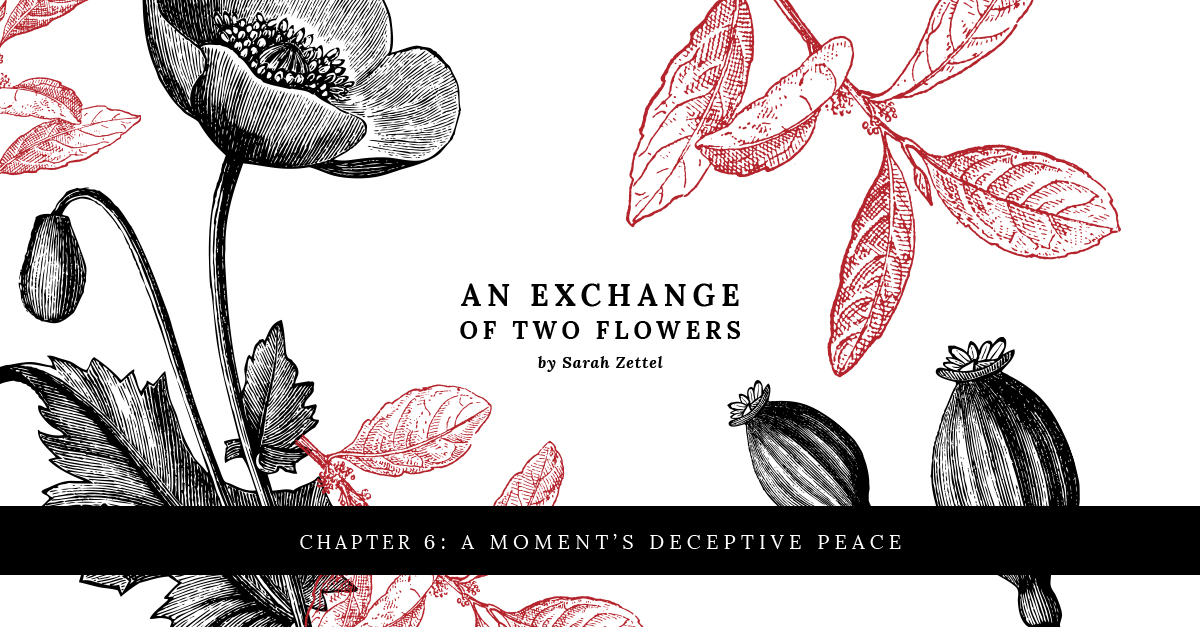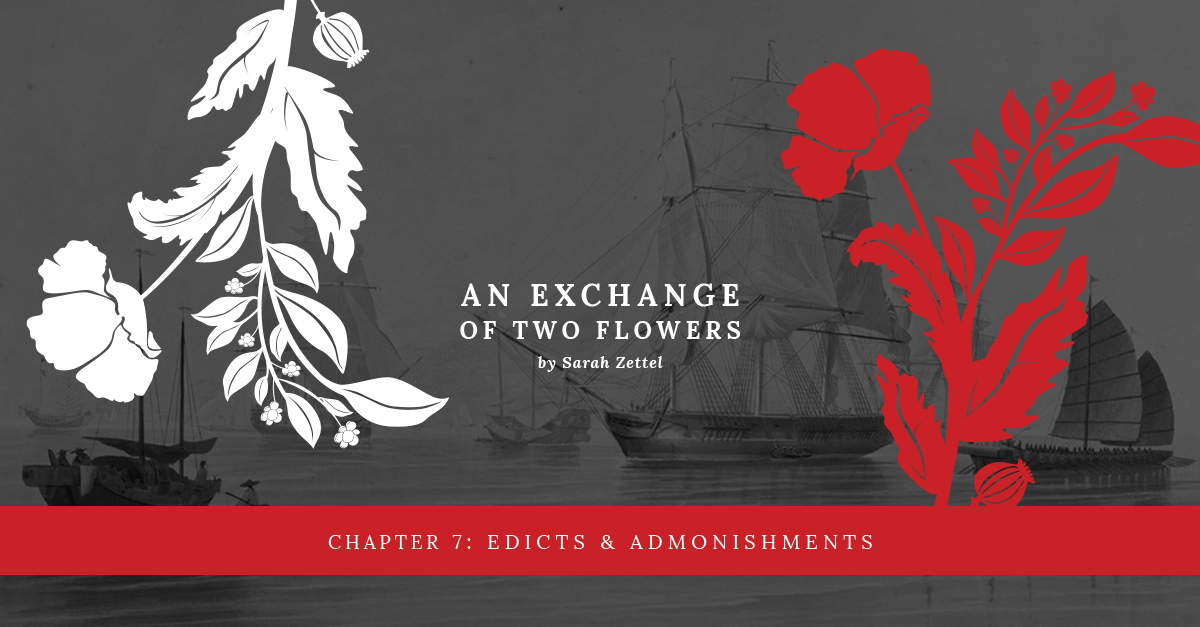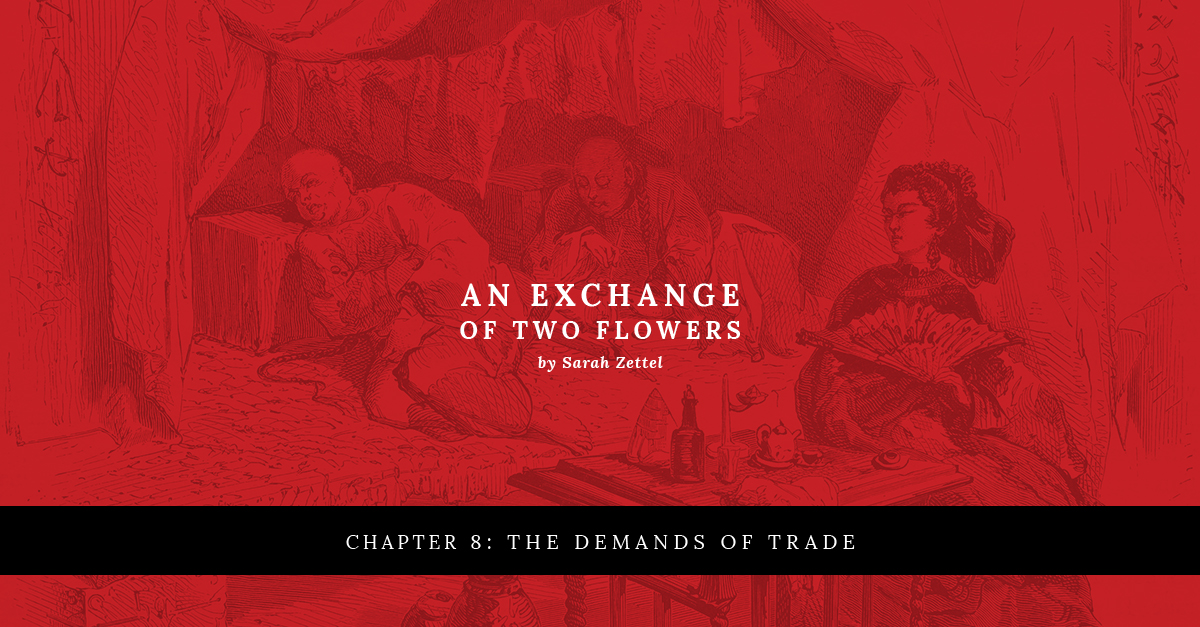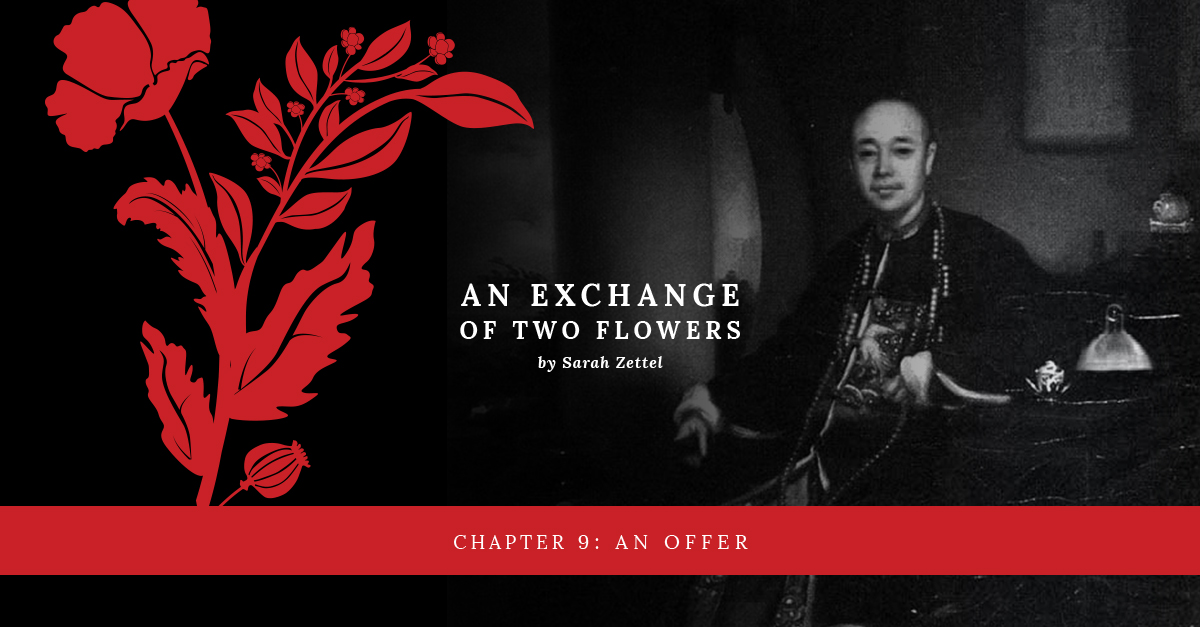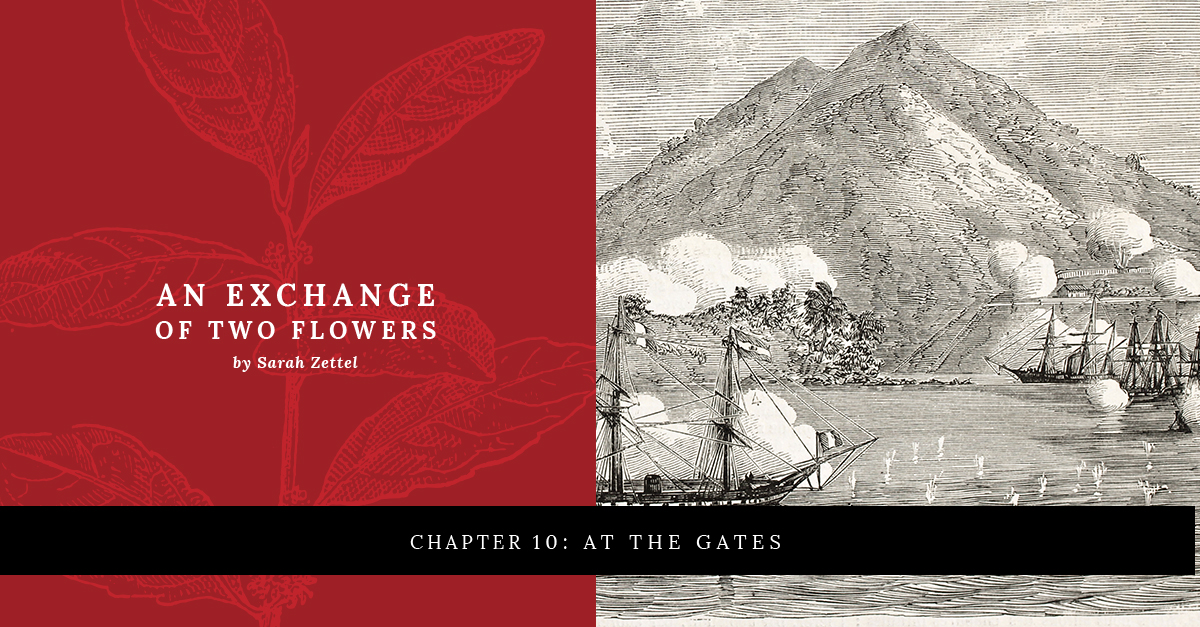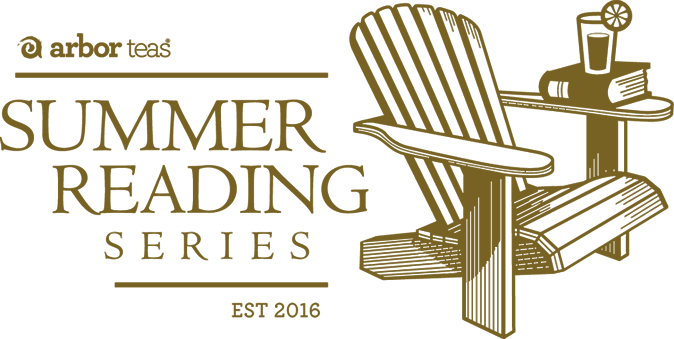

By Sarah Zettel
Join the conversation! We've put together a chapter-by-chapter list of discussion questions for An Exchange of Two Flowers, to share with friends, book clubs, or for your own introspection. This page will be updated every Thursday (June 21 - August 23) with questions related to that week's chapter. Please note: they *will* contain spoilers, so if you're not caught up, read this page with caution!
Chapter 1 Discussion Questions
Chapter 2 Discussion Questions
Chapter 3 Discussion Questions
Chapter 4 Discussion Questions
Chapter 5 Discussion Questions
Chapter 6 Discussion Questions
Chapter 7 Discussion Questions
Chapter 8 Discussion Questions
Chapter 9 Discussion Questions
Chapter 10 Discussion Questions
Chapter One introduces us to a host of pivotal characters, including the Chief Superintendent of British Trade Charles Elliot, British merchant Lancelot Dent, and the Chinese merchant Howqua. Also of interest is the soon-to-arrive, newly appointed High Commissioner Lin - on a mission to deal with “the foreign trade” and stop the opium smuggling. Tensions run high as we begin to get a glimpse of the complex web of obligations, machinations, and common causes and conflict that Captain Elliot and Commissioner Lin must navigate to fulfill their respective directives.
Discussion Questions
It is worth noting how restrictive the rules are for foreigners in 1839 Canton, China. Each country is only allowed one “factory” in a secure, walled setting, no personal houses, no women and children on the mainland, no gardens, and no man allowed to stay year-round. Chinese nationals bear restrictions as well, and are not permitted to learn foreign languages. How do you think these protective measures work for and against trade relations in 1839 China? How is the situation different today?
Superintendent Charles Elliot feels “dogged” by the opium trade. His official position has stuck him in the middle of the conflicting British and Chinese laws. In regards to this matter, where do you feel Elliot’s sympathies lay? Do his feelings about the merchant Lancelot Dent influence your opinion?
Chapter 1 ends with the beginning of a riot, as a Chinese man is about to be executed in the factories’ common square. Why do you think the execution is happening? And why did it incite the foreigners to riot?
In Chapter Two, despite being exhausted from a grueling 60 days of travel, High Commissioner Lin Zexu gets right down to business upon his arrival in Canton. The High Commissioner meets with Governor-General Deng Tingzhen, and pointedly takes his measure in regards to his management/exploitation of the opium trade. Afterward, Deng meets with the head merchant of the Cohong, Howqua, to privately confer about Commissioner Lin.
Discussion Questions
Chapter 2 sheds light on the corruption that is allowing the opium trade to flourish in China. The lure of money, despite the risk, is too great, and the deception runs high and low. Are there any parallels with today’s drug trade in America? What has changed? What hasn’t changed?
Protocol, respect for position, and adherence to tradition certainly have their place in all societies. But it can also obfuscate communication, and make direct inquiry more difficult. How does Commissioner Lin use this to his advantage and disadvantage in this chapter?
In the face of Commissioner Lin’s mandate, Governor-General Deng and the merchant Howqua seem interested in only protecting themselves and shifting the responsibility for the opium smuggling, rather than working together. Does this seem like a wise strategy? Why or why not?
In Chapter Three, High Commissioner Lin meets with an old friend, Pao Jian, who is in poor health. They discuss Lin’s mandate to stop the opium trade, what they perceive to be the true nature and interests of the English, and play some weiqi. The following day, Lancelot Dent has a clandestine meeting with the head merchant of the Cohong, Howqua. They conspire to mislead Captain Elliot, in an effort to get him out of Canton for a few days.
Discussion Questions
Lin Zexu feels that he understands the bitter anger he sees in Pao Jian’s daughter-in-law’s eyes. Why do you think Chen Saizen is angry? And why does Lin feel he understands her so well?
The strategy game of weiqi (also known as Go) originated in ancient China between 2,500 and 4,000 years ago. Curious to to know a little more about weiqi? Check out this interesting article, The Game Of Go: Ancient Applications And Contemporary Connotations.
At this point in the story, readers will have noticed that some of the characters have multiple names (their common name, formal name, English name, Chinese name). Here is a handy reference list to help keep everyone straight!
Captain Charles Elliot - Yi Lu
Chief Superintendent of British Trade
Lin Zexu
High Commissioner
Lancelot Dent - Dian Di
British merchant and principal partner of Whiteman, Dent & Brightman
Howqua - Wu Bingjian
Chief cantonese merchant and head of the Cohong
Mowqua - Lu Guangheng
Former head of the Cohong
Deng Tingzhen
Governor-General of Guangdong Province
Guang Xie
Commandant of Police
Pao Jian
Lin Zexu’s friend
Pao Tengzhou
Pao Jian’s son
Chen Saizen
Pao Jian’s daughter-in-law
Charles King
American merchant
During a stroll through the grounds of the foreigners’ factories in Chapter 4, Charles Elliot has a chance meeting with merchants Charles King and Lancelot Dent. Elliot is told of Commissioner Lin Zexu’s plans to travel to Macao, and sees an opportunity that he can’t pass up.
Discussion Questions
Previously, in Chapter 2, Governor-General Deng describes Superintendent Elliot as “mostly honest, although angry.” Elliot’s interior voice and reminiscences in this chapter shed light on why he might be angry. What are some of the reasons you found?
Despite some common interests, Elliot dislikes Charles King. Why?
Even with his firm understanding of Chinese protocol, Elliot believes he has a chance of meeting face to face with Commissioner Lin in Macao. Why would he have faith in this idea?
In a flashback during Chapter 5, Commissioner Lin Zexu visits the Imperial Palace, and receives his orders from the Emperor to “Go. Examine. Act.” In Canton, Lin spends eight days examining the extent of the opium trade, then meets with Howqua and Mowqua, to discuss the responsibilities of the Cohong, and to deliver his edict. Finally he meets with the commandant of the police, to begin the opium crackdown in earnest.
Discussion Questions
Why does the Emperor want to eradicate opium from Guangdong Province?
What did Commissioner Lin see and discover in his examination of the opium trade?
The time has come for Lin to act. Who does he enlist to help him? Who will not be of help?
In Chapter 6, Charles Elliot travels to Macao to enjoy a happy yet slightly troubled reunion with his beloved wife and children. And, he looks forward to meeting with Lord Ramsey, of the East India Company’s Board of Control; a meeting which Elliot feverently hopes will help him begin to crack open the gates to China.
Discussion Questions
What are some of personal factors driving Charles Elliot’s desire to crack open and control the gates to China?
Interested in learning more about Macao? Check out these links:
Macau in Encyclopedia Britannica
Culture in Macao
In Chapter 7 British merchant Lancelot Dent gains early access to Commissioner Lin’s edicts, and learns that Lin is taking serious measures against the opium trade: The High Commissioner has placed Dent’s name at the top of a list of foreigners dealing in opium, publicly shackled Howqua and Mowqua, all ships are to be searched, and all opium pearls and pipes turned in and destroyed. The situation is tense, and Superintendent Elliot is in the dark in Macao.
Discussion Questions
The edicts offer a reward to the “good” foreigners who turn in the the foreign merchants who have been dealing in opium. Do you think the various foreigners will stick together or will they name names? Why or why not?
The public shackling of Howqua and Mowqua came as huge shock to Lancelot Dent. What message is Lin sending, and how does this affect Dent’s chances for maintaining the status quo?
This chapter ends with a surprising bit of strategic persuasion by the American merchant Charles King. What motivated him to take Lin’s edicts to send to Superintendent Elliot? Do you think he will be successful?
In Chapter 8 Superintendent Elliot meets with Lord Ramsey of the British East India Company, and presents his plan to gain a stronger foothold in China by cooperating with the Chinese and stopping the British trade in opium. Lord Ramsey rejects Elliot’s plan, and reveals a surprising reason for continuing the illicit trade. Elliot also receives a packet containing Lin’s edict, and decides he must return to Canton at once.
Discussion Questions
What do you think about Elliot’s plan and Lord Ramsey’s response? Is it truly too late for the Company to stop the opium trade, or do you think they just want to keep making and taking the “easy” money? Would it have made a difference to Lord Ramsey if he knew what was happening back in Canton at that very moment?
Charles Elliot craves social acceptance and a position of power, but continues to be slighted by those around and above him. How does class play a role in this chapter for Elliot? What do his internal monologues reveal about his struggles? Do you think it was an intentional insult on Lord Ramsey’s part to greet Elliot as “Captain Elliot” instead of “Superintendent Elliot?”
Clara and Charles are both victims of circumstance of birth. In the face of adversity, Clara proves herself a strong woman. She is very much her own person but is also an officer’s wife. How does Clara both accept and challenge the roles that society and her husband have given her?
In Chapter 9 Lin meets in private with Lu Guangheng (Mowqua), who proposes a plan to stop the opium trade by replacing it with another commodity: tea. As he considers this idea, Lin decides to pay a visit to Pao Jian’s house, only to be shocked, saddened and angered by his friend’s very recent death.
Discussion Questions
Lin gives serious thought to Lu Guangheng’s strategy to stop the opium trade by replacing it with a lucrative underground tea trade. What are the potential problems and benefits to this proposition?
Lin takes 2 weiqi stones from Pao Jian’s house. Why do you think he does this? How has the weiqi board been an important symbol in this story?
The death of Pao Jian hardened Lin’s resolve to stop the opium trade and punish those who facilitated and profited from the illicit market. He is no longer open to ideas of negotiation. Do you think his judgement could now be clouded by personal factors?
In Chapter 10 Superintendent Charles Elliot arrives back in Canton to find the docks by the foreigners’ factories eerily empty - and the factory gates barred. Elliot immediately grasps the perilous position that his merchants and all the foreigners are in, and acts to protect them. In a final showdown with Lancelot Dent, Captain Elliot finally wields the power he so desires, and sets the future of nations in motion.
Discussion Questions
Upon his return to Canton, Charles Elliot acts swiftly and smartly; following his sworn duty to protect British lives and property. How do you think this chapter may have played out if Elliot had not arrived back in time and Johnston (and Dent) were left in charge?
Elliot gives Lancelot Dent the ultimate choice: “I can hand Lin the opium, Mr. Dent, or I can hand him you….Which is it going to be?” Why was it so important that Dent be given a choice? Who holds the real power here, Charles Elliot or Lin Zexu?
What does the author’s use of poetic language in the epilogue, and Lin’s begging of forgiveness to the Goddess of the Sea, tell us about the Commissioner’s character?
Is this really the end of the opium trade? Interested to know how this turbulent period of history plays out? Check out one or more of the resources on the author’s suggested reading list!
AUTHOR’S SUGGESTED READING
A great deal has been written about how tea came to the West, and about the First Opium War. People can and do spend a lifetime researching the subject. I’m listing just a few of the more readily available English sources here for those who are interested in reading more about this historical period. I hope you enjoy.
Ellis, Markman, Empire of Tea: the Asian Leaf that Conquered the World, 2015: Reaktion Books
Hohenegger, Beatrice, Liquid Jade, 2006: St. Martin’s Press
Waley, Arthur, The Opium War Through Chinese Eyes, 1968: Stanford University Press
Perdue, Peter C., The Rise and Fall of the Canton Trade System, Parts 1-3, MIT Open Courseware
